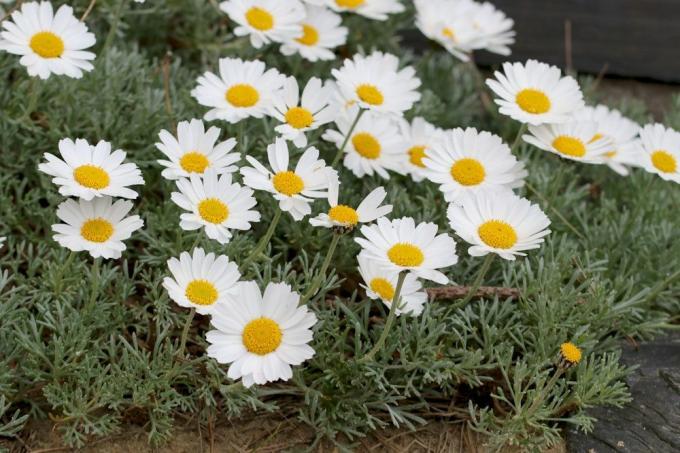
table of contents
- Marguerite: Poisonous or not?
- dogs
- Cats
- Horses
- Medicinal plant
The marguerite is a typical sight of the meadows and gardens of Central Europe and can be kept without much effort. The daisy family with their white petals and golden-yellow tubular flowers are often collected by children and kept in pots. As with so many other plants, the question arises with the daisies as to whether they are are toxic or what dangers lurk for adults, children, dogs, cats and other animals can.
Marguerite: Poisonous or not?
If you are also wondering whether the daisy is poisonous or not, you can calm down. Like the related daisies (bot. Bellis perennis) do not contain any real toxins and for this reason can in most cases be eaten, touched and even processed without any problems. Nevertheless, the plant is not entirely harmless. Daisies are known to Contact allergies to trigger, which is due to the polyacetylenes contained. These cause the following symptoms after contact with the skin:
- Skin irritation
- Redness
- itch
All of these symptoms combine to form a so-called Contact dermatitisthat is clearly visible on the skin. People with a weak immune system, weakened people, very young children and sick people are particularly affected by this. In most cases, contact dermatitis is not really dangerous, but it does cause discomfort and can scratch the affected areas. Children in particular tend to scratch the reddened and itchy areas, which can lead to inflammation. Since the daisy is not poisonous, anyone can actually eat it. You should just make sure to wear gloves while doing this so that the polyacetylenes do not get on your skin and lead to contact dermatitis.
dogs
Man's best friend is perfectly safe about the potential dangers of contact allergy from daisies. The flowers even belong to the completely harmless plants that you can keep in the garden or in pots in close proximity to the animals. It doesn't even matter what kind of daisy it is. Dogs can even eat the flowers without suffering a toxic reaction. In the rarest of cases, a contact allergy can also occur. However, the animal must have one of the following characteristics:
- weakened
- ill
- another puppy
- hairless
Yes, hairless dogs like the Chinese Crested Dog or the Peruvian Hairless Dog can suffer from the ingredients due to their exposed skin. The symptoms are similar to those of humans, depending on the size and weight of the animal. A hairless dog will endure more than a crested dog because it is significantly larger. You should consider this option for daisies and dogs. In the case of puppies, you must also be careful not to eat too many of the flowers, as this could lead to stomach upsets.
Cats
Cats are difficult fellows when it comes to poisonous plants. The reason? Compared to dogs, four-legged friends do not use their sense of smell to explore their surroundings, as this is too poorly developed. Exactly the same problem arises with taste, because the animals mainly perceive bitter substances, sour products and amino acids from meat and fish. For this reason, the house tigers nibble on every plant in the area if it has not been marked. In this way they try to remember flavors and which plants are inedible. Fortunately, daisies are not poisonous and pose no threat to the animals at all, and you can let your furry roommates play with the flowers.
tip: Even for rodents and rabbits, the daisy does not pose any real danger, as the ingredients are extremely well tolerated by them. But you should be careful not to permanently feed large amounts, as these can lead to digestive problems over time.
Horses
If you are a proud horse owner there is no need to worry about your mount. Leucanthemum poses no danger to horses and even larger quantities cannot harm the animals. The reason for this is, on the one hand, the size of the animals and the resistance to the ingredients that do not cause contact allergies in horses. You can have the ungulate eat daisies without any problems if you spot them in the pasture.
tip: Be careful to use yellow varieties of the plant such as the yellow summer marguerite (bot. Leucanthemum superbum) not the poisonous Jacob's groundwort (bot. Confused Senecio jacobaea). This is highly toxic as it contains pyrrolizidine alkaloids, which permanently damage the liver of the animals, and up to 80 grams of fresh ones are sufficient blossoms per kilogram of body weight to lead to death.
Medicinal plant
Did you know that healthy people can even enjoy the daisy in different ways without any problems? In a few regions, Leucanthemum used to be considered a medicinal plant, which should be helpful for numerous ailments and has the following properties:
- antispasmodic
- expectorant
- reassuring
The flowers develop this effect when they are brewed as tea or eaten raw, for example on a salad. Marguerites are also effective against abscesses and cuts if they are treated directly with them. As already mentioned above, sensitive people should definitely avoid this use, as consumption or ingestion as tea could also lead to contact allergies.

Note: Please note that this article does not in any way replace a visit to the doctor. There is no guarantee that medical statements are correct.
You will find detailed information on first aid in the event of poisoning and important information on poison control centers here.





